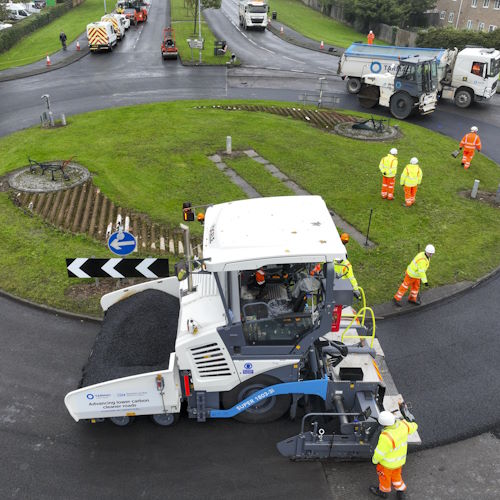ULTILOW BIO - CARBON CAPTURE BIOGENIC ASPHALT
Low carbon biogenic asphalt for road surfacing
Stockton and Hartlepool

Client
Hartlepool & Stockton Borough Councils
Contractor
Tarmac Contracting
Location type
Main Road and Roundabout
Completion
November 2023
The challenge
Three local roads in the North-East have become the lowest carbon highways ever to be resurfaced in the UK, thanks to a project that has set a new benchmark for the way roads are maintained. Working in partnership with Hartlepool Borough Council and Stockton-on-Tees Borough Council together with international partners including Shell, Volvo CE, Wirtgen and JCB, Tarmac, has reduced the carbon emissions of the road schemes by up to 80% compared to projects using traditional methods. It is understood these projects have the lowest CO₂ emissions for road resurfacing in the UK without using carbon offsetting. The project team combined an extensive range of low carbon materials, techniques and plant equipment for the very first time to resurface a section of the A689 in Wynyard, near Hartlepool, and two residential roads in Stockton-on-Tees Borough.
Combined carbon savings
By combining lower carbon materials sustainable plant and production technology the scheme managed to leverage carbon savings from a variety of sources and drive down the net carbon emissions. Warm mix asphalt was used together with a new bio-component binder from Shell which uses bio-genic materials to create a technical carbon sink in the road to prevent carbon being released into the atmosphere. The surface course was supplied as a BIO ULTIPAVE 10 SURF 70/100 and the binder course as a BIO AC 20 DENSE BIN 40/60 DES. The binder course used 30 per cent recycled asphalt planings (RAP) in the lower layer with 20 per cent in the surface course to reduce the need for primary materials. Shell developed a prototype C375 binder for this contract with an additional 50% increase in bio-oil content beyond the C250 bio binder previously available. This increased biogenic content further reduced average embodied carbon by 23%.
Results and benefits
In all, 1,562 tonnes of Tarmac’s Biogenic Asphalt was supplied and laid on the Hartlepool and Stockton schemes. Using the prototype biogenic asphalt mixes along with other carbon saving measures achieved a net reduction in carbon emissions of around 80%. This was achieved while meeting all of the critical specification and performance requirements including incorporating high PSV 65 aggregate. The clients were delighted with the carbon savings achieved on these schemes. Councillor Mike Young, Leader of Hartlepool Borough Council, said: “The Tees Valley is an area renowned for innovation, and I’m delighted and proud that we are leading the way nationally – in partnership with Tarmac – with these low-carbon road resurfacing schemes. Schemes such as this reflect the Council’s determination to reduce its carbon footprint to help tackle the causes of climate change. We are committed to becoming a “Net Zero” emissions authority by working in partnership with a range of stakeholders”
